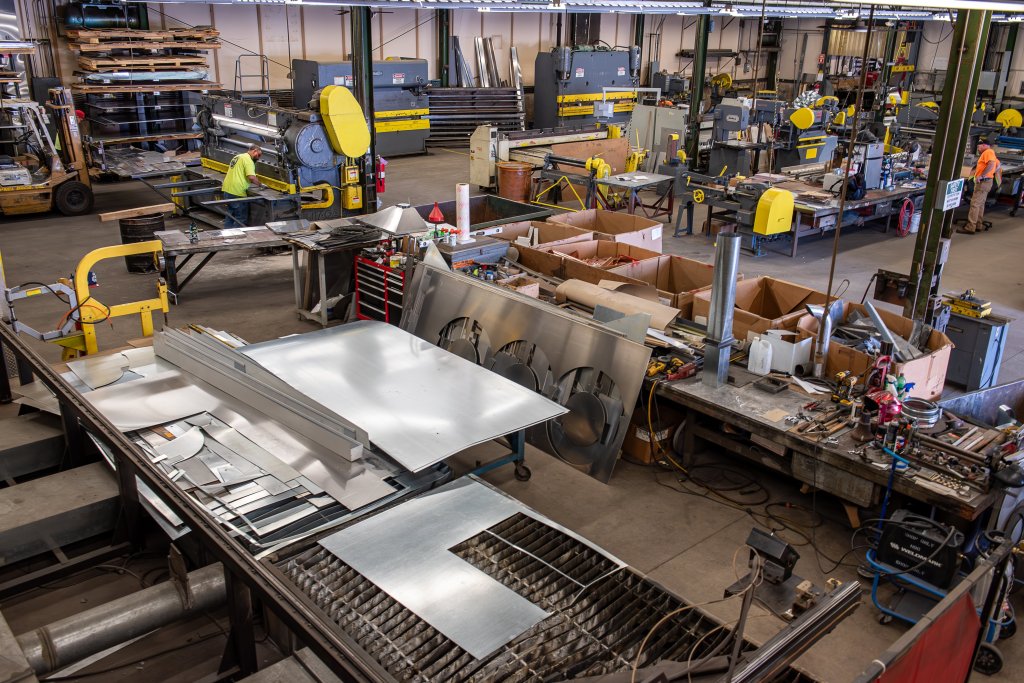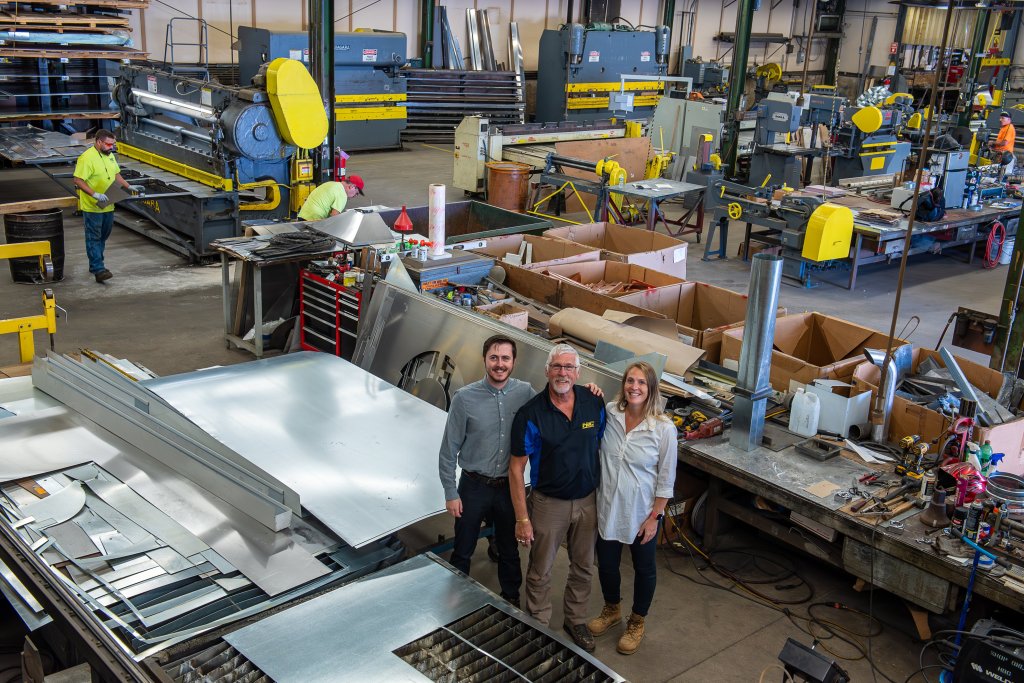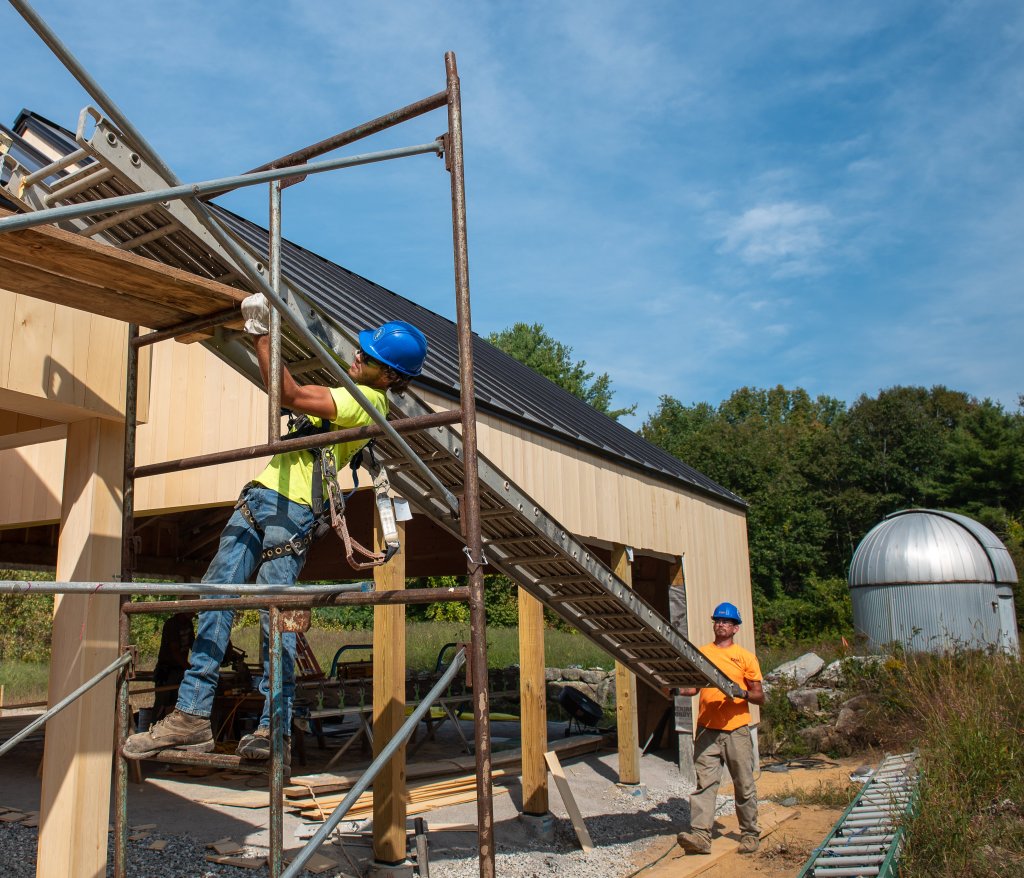LEWISTON — They call themselves tin knockers — slang in the construction industry used to describe a sheet metal worker or metal duct installer — a term derived from workers knocking on tin as they fabricated metal roofs or ductwork. It’s also a term used to describe nonunion workers in the trade.

A portrait of Oscar Hahnel from the Lewiston Daily Sun from around 1918.
“My grandfather was a itinerant sheet metal worker,” Alan Hahnel said, describing his grandfather, Oscar Hahnel. “He went around the country selling his skills and traveled by train. He was a hobo for a couple years. He went to California and St. Louis — he went to the big cities to find work and eventually came back and had enough money to be able to buy the cornice company.”
In the early 1900s, three brothers in Lewiston — Oscar, Frederick, and Emil Hahnel — bought out Lewiston Metal, Cornice & Skylights Works and by 1916 Hahnel Brothers & Co. was founded.
The company is 108 years old, but this year is marking 100 years of incorporation in the state of Maine, a milestone acknowledged by Maine Secretary of State Shenna Bellows back in May.
“Hahnel Brothers Company represents the best in long-standing Maine family-owned businesses,” Bellows said in a statement issued with the proclamation.
THE EARLY DAYS OF HAHNEL BROS.
As early as 1918, the scope and breadth of work Hahnel Brothers was doing was recognized in a Lewiston Daily Sun article, which reads in part: “They have had an especially busy season this year and some big contracts. The copper work on a dormitory building at Bowdoin College required 7,000 pounds of copper.”
Alan Hahnel, today the president of Hahnel Bros. Co., recalls that in those early days, the business was simpler and dealing with the market conditions of the times. For instance, there were no trucks in Lewiston to haul materials.
“There was a gentleman who had rented his horse and wagon, who would park up on the corner of Main Street and Bates Street,” Hahnel tells the story. “The men would have to walk up the hill, hire him with cash and he would come down or go to a railroad siding to take the material off the railroad car and transport it to a work site, where they would then install it on a roof.”

Hahnel Bros. Co. worker Donovan Godin climbs on top of a metal roof being installed Sept. 18 at the construction site of Roberts Farm Experiential Learning Classroom in Norway. Russ Dillingham/Sun Journal
The Lewiston Daily Sun article goes on to note the company “had recently begun to do more in the way of tar and gravel roofing,” essentially adapting to the market demands.
The early focus of Hahnel Bros. Co. was cornice work and skylights for commercial properties. Hahnel explained that a lot of building interiors had metal walls and ceilings, ornamental metal ceilings — all the domain of the tin knockers.
“His skill was sheet metal work, cornice — you know the metal work on the outside of the building, and (the company) moved into flat, hot asphalt because he was working on roofs, Hahnel explained, speaking about his grandfather. “A lot of the mills, the high rises, the building constructions were flat roofs. So he branched out into the type of buildings within the area.”
The hand-operated machines used to cut, bend, and form metal are the same machines used for heating, ventilation and air conditioning ductwork. So, Hahnel Bros. Co. then expanded into ductwork.
“We had the machinery and developed the expertise to make ductwork,” Hahnel added, “so we grew into a sheet metal and roofing business which was common at the time. It’s no longer as common,” he said.
A THIRD GENERATION CLIMBS THE LADDER
Alan Hahnel left Lewiston after high school, heading first to Worcester Polytechnic Institute in Worcester, Massachusetts, where he obtained a civil engineering degree and worked summers back in Lewiston learning from the ground up — gopher, laborer, and as he described it — lowest man on the totem pole.
“As a young man I had the strongest back and I lugged heavy things from point A to point B.” After graduation in 1974, he started working for a firm in Boston that designed power plants for OPEC — the Organization of Petroleum Exporting Countries.

Rebuilding Together Lewiston-Auburn board member Alan Hahnel, left, with white hat, removes shingles May 7, 2022, on a home on Connor Lane in Poland with the help of his children and a group of Bates College students. Russ Dillingham/Sun Journal file
The oil embargo of 1973 soon interrupted his plans, with Hahnel and 2,000 other engineers losing their jobs as a result of the embargo. He headed west to Colorado, where he worked for about five years as an engineer with precast concrete companies until he got a phone call from his father — Oscar Hahnel Jr. — to come back to Lewiston.
The U.S. economy was in a bad recession in the early 1980s, with soaring inflation and high unemployment. Hahnel’s father told him he needed him to design and work with the sheet metal department to grow the business. “I do remember one of the first things I had to do was lay off nine tin knockers,” Hahnel said, noting it was not a pleasant experience.
Hahnel Bros. came through the 1980s and into the 2000s in a growth mode, with the addition of pneumatic conveying systems — dust collection systems for mills — and then got into siding for commercial buildings. Growth for the company from these two additional lines of work was significant.
HIGH VISIBILITY PROJECTS
You would be hard-pressed to put a number on all the commercial buildings in Maine and New England Hahnel Bros. Co. has worked on over the last century.
In 1935 they installed the slate roof on the sky-scraping Basilica of Saints Peter and Paul. In 1950, they were called back to install lead-coated copper caps on the church’s eight spires to prevent further damage from pollution caused by the burning of coal in the city.

Clutching his fedora, Henry Hoffman, treasurer of Hahnel Bros. at the time of this 1950 photo, stands at the top of a spire of the Basilica of Saints Peter and Paul 168 feet up. The unidentified workers were installing lead-coated copper caps on the original limestone spires to prevent further deterioration caused by pollution from coal burning in the city. Submitted photo
Other roofing projects include the copper dome on the Lewiston City Hall, the Gomes Chapel at Bates College, Oxford Resort Casino, Lobster Trap in Steuben, Maine, buildings at the University of New Hampshire, the University of Maine fitness center in Orono, high schools in Newport and Farmington, Maine Medical Campus in Scarborough, Jackson Laboratory in Bar Harbor and The Turrets at College of the Atlantic, also in Bar Harbor.

The slate roof of The Turrets at College of the Atlantic in Bar Harbor was restored in 2014 by Hahnel Bros. and is considered one of Maine’s architectural treasures. Courtesy of the College of the Atlantic Archives and Special Collections
Designed in 1893 by New York architect Bruce Price, The Turrets is the only remaining building designed by the architect still standing on Mount Desert Island. In 2012, the school selected Hahnel Bros. to restore a badly deteriorated slate roof — part of a nearly $4 million restoration project of the building, which now serves as the main administration building on campus.
Maine Preservation calls The Turrets “one of Maine’s historic and architectural treasures and a centerpiece of the college campus.”
Despite the high-profile nature of some of their work, Hahnel says he doesn’t have a favorite job. There’s been too many.
WHAT THE FUTURE LOOKS LIKE FOR THE NEXT GENERATION
Hahnel Bros. also has a long history with Bangor. Back in the 1920s a roofing foreman for the company named Leo Cormier wanted to move back to Bangor and start his own business. Hahnel Bros. leaders helped him finance the business and they bought out Merryman’s Roofing and incorporated it as the Bangor Roofing and Sheet Metal Co. in 1930.
By 2005, Cormier had died and his sons got out of the business. The decision was made to merge the two companies instead of compete for a lesser share of the pie.
The company survived the great recession of 2007-2009 and was thriving until the COVID-19 pandemic hit. At the time, Hahnel Bros. had about 150 employees between Bangor and Lewiston. Deemed an essential business by the government, Hahnel Bros. did not shut down but had to adapt to restrictions like social distancing.

Alan Hahnel, middle on scaffolding, works with board members and volunteers from Rebuilding Together Lewiston-Auburn to rebuild a roof on a home during the volunteer group’s annual Rebuild Day in 2020 at a home in Poland. Russ Dillingham/Sun Journal file
Alan Hahnel says it did not go well. Some workers quit outright rather than conform, and some retired. “It was a struggle,” Hahnel said, “and over time I think a lot of the older people — it just exhausted them and it was, you know, I’m going to retire. I’m leaving.”

Earlier this year, Maine Secretary of State Shenna Bellows visited Hahnel Bros. Co. in Lewiston to mark the milestone of 100 years of incorporation in the state. Submitted photo
Some decided the government payouts were more attractive, while others left to fill the delivery and e-commerce jobs that emerged. Hahnel’s workforce was hit hard, dropping to at or below 100. That has forced a change in how the company goes after business and thinks about its future.
Despite that shift in workforce caused by COVID, throughout the years many employees have stayed with Hahnel and been rewarded for their loyalty. Currently five sets of family members work at Hahnel Bros., including the Hahnel family.
Daughter Elizabeth and son Jesse are the fourth generation of the family to work for the company. Elizabeth Hahnel Bacon is the director of safety and Jesse is a project manager and estimator in the sheet metal division. Like his father, Jesse Hahnel started at the bottom — as sheet metal laborer installing ductwork in the field and has learned how to weld and clean duct work.
Jesse Hahnel says he’s picked up his father’s handiwork and relationship building skills and plans to stick around. “I intend on staying,” he said.
Elizabeth Hahnel just had her second child, which means there could be a fifth generation in the offing. “I’ll be here forever unless someone fires me,” she said tongue-in-cheek.
“For us growing up, I always felt like it wasn’t just Hahnel Brothers,” she added. “We did a lot of things like Rebuilding Together (Lewiston-Auburn) and we’ve gone on mission trips with the church. … When I think of Hahnel Brothers, I also think about the employees and all of the community.”
“We’re not who we used to be,” admitted Alan Hahnel. “We’re reinventing ourselves as a small family-owned business which conveys, we think, to the community it’s a multigeneration family business. We’ve got staying power,” he said, adding, “We’re in it for the long haul and I’ve been blessed with two children that want to be in the business.”
Send questions/comments to the editors.










We invite you to add your comments. We encourage a thoughtful exchange of ideas and information on this website. By joining the conversation, you are agreeing to our commenting policy and terms of use. More information is found on our FAQs. You can modify your screen name here.
Comments are managed by our staff during regular business hours Monday through Friday as well as limited hours on Saturday and Sunday. Comments held for moderation outside of those hours may take longer to approve.
Join the Conversation
Please sign into your Sun Journal account to participate in conversations below. If you do not have an account, you can register or subscribe. Questions? Please see our FAQs.